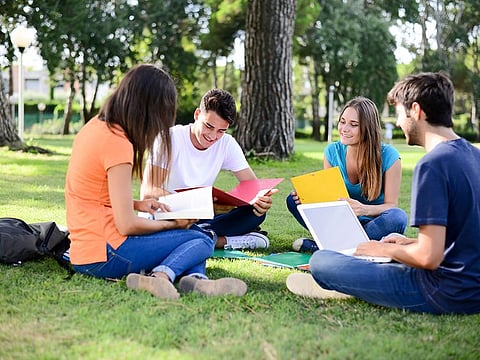The benefits of university courses in the UAE
Heriot-Watt’s new campus will facilitate blended learning for ideal educational outcomes

COVID-19 has significantly altered the world of higher education, including here in the UAE. Students and staff have suddenly needed to adapt to distance learning and undergraduates and post graduates have been required to further embrace digital technology and learn to study and reason more independently.
Professor Ammar Kaka, Vice Principle and Provost, Heriot -Watt University Dubai, says that he has been reassured by both students and staff’s ability to evolve the way they work.
“Students have had to adapt to an online way of learning since the pandemic and we are proud of the way they have done this quickly. Our staff have also been able stay connected with our campuses in Edinburgh and Malaysia, allowing them to use additional resources to facilitate the highest standards of remote learning.
The digitally enhanced spaces in the new, revolutionary campus will allow networking opportunities for students regionally and globally.

“I believe it is important that we guide our students through these times and support them through strong communication, allowing them to succeed in a post COVID-19 world.”
A new campus for a new age of learning
In January 2021, Heriot-Watt, which has been awarded a five-star rating from the Knowledge and Human Development Authority (KHDA), will open a state-of-the-art brand new 218,000 sq. ft campus in Dubai Knowledge Park. Professor Kaka describes the new campus as “digitally-enabled, allowing for the changing landscape of education post COVID-19.” It will be a campus conceived to adhere to the latest directives from the government, guaranteeing students’ safety, from blended learning to providing remote access to resources.
Heriot-Watt’s Strategy 2025 is called Shaping Tomorrow Together. The vision is based on four core values - inspire, collaborate, belong and celebrate. Professor Kaka says that these principles are central to the concept of the new campus, which will feature digitally-enhanced classrooms, seminar halls and laboratories as well as in-house recording studios.
Last week, The UAE Ministry of Education announced that it is considering plans to resume teaching in schools and university in September and stressed that, “safety of all students across the nation is a key priority.”
With social distancing and a combination of remote learning and physical lessons and seminars seemingly here for the foreseeable future, how will students stay connected to their studies?
At Heriot-Watt, Professor Kaka says that, “the digitally enhanced spaces in the new, revolutionary campus will allow networking opportunities for students regionally and globally.” He refers to how the campus will be connected to Heriot-Watt’s other campuses in Scotland and Malaysia and that it will also provide students with opportunities to interact with other students and businesses in both the UAE and around the world.
Professor Kaka cites the example of the new campus’ Enterprise Floor – an entire level dedicated to entrepreneurship and innovation. “It allows students, researchers and staff to work and interact with entrepreneurs and business leaders. Enterprise Floor brings together GRID (Global Research, Innovation and Discovery), infrastructure and the business incubators at our Edinburgh Business School.”
Students will also be able to learn in a new state-of-the-art mechanical engineering laboratory, designed specifically to support the Dubai University’s planned robotics course and featuring a world-class Robotarium, where they can test robot algorithms on multiple machines.
Adaptable curricular
Professor Kaka believes that students will need to learn to constantly evolve their skills throughout their working lives and that learning should be flexible post-COVID-19.
“It is likely that all industries will change and have new skill sets required, he says. “Through ongoing research and collaboration with industry, we amend curriculums to adapt to change and ensure that Heriot-Watt students are prepared for this. This applies to our wide variety of courses that include Data Science, Computing and AI, Business, Accounting and Finance, Psychology, Architecture and Design, Construction and Engineering.”
A post-COVID recovery
During COVID-19, Heriot-Watt is supporting its students’ online learning with constant communication and a Virtual Learning Environment (VLE). “The VLE offers students an interactive and engaging learning environment which delivers live and recorded video content, surveys, assignments and quizzes. It also encourages students to partake in online discussions and track their online learning progress.” says Professor Kaka.
The University has also launched initiatives such as its Home Fee Guarantee concession for British students who are based in the UAE and unable to travel home due to the coronavirus. Under the scheme, the students can commence their studies at Heriot Watt’s Dubai campus. They then have the freedom to transfer to the UK campus and resume their studies once restrictions are lifted.
Yet Professor Kaka believes university teaching methods must continue to be agile in order to react to a post-pandemic world.
“Higher education institutes will need to ensure that they are identifying important skill gaps and are delivering new courses and learning so that students can stay relevant to potential employers,” he says.
To learn more about Heriot-Watt University Dubai click here.
This content comes from Reach by Gulf News, which is the branded content team of GN Media.